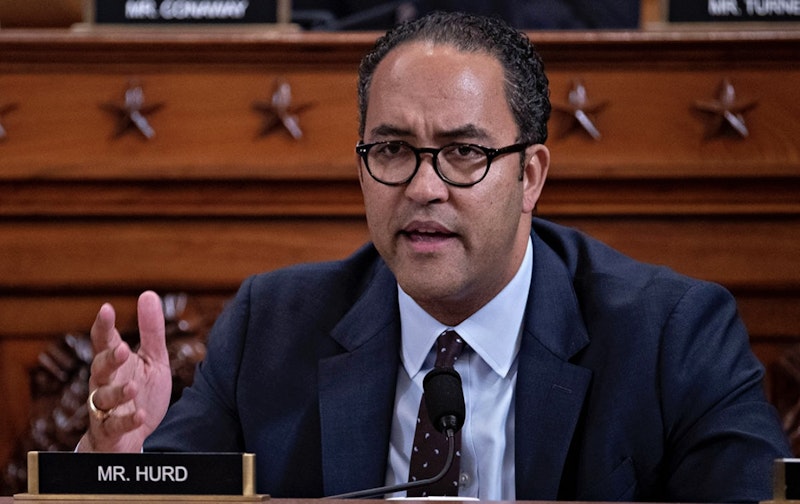I recently wrote that I’d consider voting for Chris Christie if he were the Republican presidential nominee, in contrast to varying degrees of hostility I broadly have for the Republican field, particularly the current front-runner and runner-up, neither of whom I’d ever vote for under any circumstances, for numerous factors including the first’s criminal effort to overturn an election, and the second’s cretinous Mauskampf. I ruled out Nikki Haley and Vivek Ramaswamy, didn’t quite rule out Tim Scott, and left Asa Hutchinson in abeyance as someone to whom I haven’t been able to bring myself to pay attention.
With Will Hurd’s entry into the race, the short list of Republicans I might support gets a new top contestant. A confirmed moderate who’s staked out an anti-culture-war position of “Don’t be an asshole,” he voted with my former party more than I would’ve, but has shown a willingness to buck the GOP’s rightward trend on matters ranging from immigration to LGBT rights to gun control. He’s an Urdu-speaking ex-CIA covert operative, a positive by my lights. He correctly sees climate change as a “threat multiplier,” acknowledging an influence by climate scientist Katherine Hayhoe. He’s been a Trump critic since 2016, voted no on the first impeachment (a vote I disagreed with, but at least he had arguments rather than knee-jerk partisanship), wasn’t in Congress for the second impeachment; and speaks as forcefully against Trump as Christie now does, without the latter’s recent conversion and suck-up history.
At the midpoint of 2023, it seems to me that nothing about the 2024 presidential election is inevitable, and certainly not that Trump will be the Republican nominee. I perceive that Trumpism is burning out, and that the broader authoritarian tendency in the GOP, of which Ron DeSantis has stood as a purist avatar, denouncing Trump for things Trump got right such as criminal-justice reform and vaccine-development, is also fading. I don’t expect some moderate party to emerge, but maybe one that has some creative tension between differing strands of right and center-right, rather than a party in which any hint of deviance generates chants and rants against “RINOs” and “globalists.”
Unlike most of the Republican hopefuls, Hurd—and to some degree, Christie, and maybe Hutchinson, whoever he is—would inspire some independents and moderate Democrats, such as myself—to see a viable alternative, and plausibly to cast a vote for a functioning two-party system, in which the parties disagree on many policies but find common ground when possible, and adhere to basic rules, such as not pressuring state electoral officials to “find” bogus votes so that a losing candidate wins.
I’m an optimist, and that can run to excess, as in the run-up the last presidential election when I predicted that a decades-long right-wing era was ending, an overstatement at best; and, worse, that “Trump Will Leave If He Loses,” a flatly-wrong argument that, besides some performative whining, a presidential transition would proceed as normal. So, to put some constraints on optimism: One can hope that the right will shift toward market-oriented and forward-looking outlooks such as had a degree of prevalence in the Reagan era, but any such transformation will have its limits. Even a President Hurd, for example, would have to deal with portions of his own party demanding greater confrontation and a rejection of liberal and democratic values. The Trump era may be remembered as a nadir, but it will have far-reaching effects. Among those will be that the taboo against rejecting electoral results, once breached, can never be fully restored.
The direction of the left is similarly uncertain. Fissures in the Democratic Party have largely been papered over by unified opposition to the Republican Party, but a more-moderate GOP could have the perverse effect of pushing the Democrats leftward. Already there’s been turmoil at progressive organizations over activists’ demands that issues ranging from environmental protection to reproductive rights be focused on the impact on marginalized groups, rather than seeking to appeal to broad public interests.
Still, if Hurd is the 2024 Republican nominee, he’ll be well-positioned to make a strong contrast with the Democratic nominee, presumably Biden, notwithstanding expected complaints from the right that a moderate such as Hurd concedes too many of the Democrats’ ideological points. Hurd could make a case that the Democrats, in their orientation toward the social-justice outlook, set demographic groups against each other instead of offering policies for a more-cohesive nation. He wouldn’t need to point out that he’s Black, or say as Tim Scott does that a successful Black Republican refutes Democratic ideology, because Hurd’s personal story will be more that he’s an independent thinker who’s worked to defend this country; also, that he’s not beholden to Trump, and he’s a lot younger than Biden; and that he’s not an asshole.
—Kenneth Silber is author of In DeWitt’s Footsteps: Seeing History on the Erie Canal and posts at Post.News.

